- Home
- Philip Roth
The Anatomy Lesson Page 18
The Anatomy Lesson Read online
Page 18
He couldn”t have stopped if he’d wanted to. Let him speak.
> 5 <
THE CORPUS
HE had registered as a man grossing seven million a year. He remembered, some time earlier, trying a sentimental walk around the Loop as himself. When that didn’t work he got back in the car, and they drove on to the Ambassador East. They drank in the bar. As best he remembered, he’d brought tremendous pressure on her to come back with him to New York to drive his Rolls. When men like that want something, they don’t stop till they get it. He’d offered an enormous future as chauffeur to Milton Appel. She laughed, a good-natured girl of twenty-seven, only a few years out of rural Minnesota, cheery, polite, not at all so simple as she’d first sounded, with remarkable turquoise eyes and a blond braid and the chunky arms of a healthy child, She laughed and said no, but he wouldn’t let up. The well-known pornographical paradox: one has to esteem innocence highly to enjoy its violation. He was taking her to the Pump Room, he told her, to negotiate further over dinner, but when he came up to his room to wash and to change, he’d dropped onto the bed to assuage the flesh, and now it was a dim winter morning.
Back in 1949, when the dangers of night stalking were still all metaphorical, he’d circle the Loop three and four times after dark. Starting at Orchestra Hall, where the unmusical boy raised on “Make-Believe Ballroom” and “Your Hit Parade” had first heard Beethoven’s Fifth, he would cut across to LaSalle (seething with hatred for the Stock Exchange) and on up to Randolph and the garish downtown that reminded him always of home, of Market Street back in Newark, of the chop-suey joints and cheap specialty shops, the saloon grills, the shoe stores, the penny arcades, alt battened down beneath rooftop billboards and fastened in by the movie palaces. At State and Lake he’d pass under the El and, resting against a pillar, wait for the thrill of the first vibrations. That he who had been born in New Jersey should hear an elevated train pounding overhead in Illinois seemed to him as dark and exalting as any of the impenetrable mysteries tormenting Eugene Grant in Of Time and the River. If this can happen, anything can happen. Meaning by “anything” nothing at all like the pain in the neck that in 1973 forced him back to the limousine after just a few blocks, and on to the hotel where he’d slept for ten hours in his clothes.
He’d dreamed all night. There was a nude woman. She was short and firm, her face obscure, her age indecipherable except for the youthful breasts, grotesquely high and spherical and hard. She was posing on a platform for an art class. It was his mother. Drenched in yearning, he dreamed again. She flew into his room, this time clearly his mother and no one else—only she flew in as a dove, a white dove with a large round white disc, toothed like a circular saw, whirling between her wings to keep her aloft. “Strife,” she said, and flew out through an open window. He called after her from where he was pinned to his bed. Never had he felt so wretched. He was six and calling, “Mama, i didn’t mean it, please come back.”
She’s with me here. At 3 a.m., in the Ambassador East, where he was doubly disguised—falsely registered under his worst enemy’s name, and passing himself off as a social menace—his mother’s ghost had tracked him down. He wasn’t being poetic or mad. Some power of his mother’s spirit had survived her body. Always he had tended to think rationally, as a rationalist, that life ends with the death of the human body. But at three that night, wide awake in the dark, he understood that this is not so. It ends and it doesn’t. There is some spiritual power, some mental power, that lives after the body is dead, and that clings to those who think about the dead one, and my mother has revealed hers here in Chicago. People would say this is only more subjectivity. I would have said so myself. But subjectivity is a mystery too. Do birds have subjectivity? Subjectivity is just the name for the route she takes to reach me. It’s not that I want to have this contact or that she wants to have this contact, and it’s not that the contact will continue forever. It is also dying tike the body is dying, this remnant of her spirit is dying too, but it’s not quite gone yet. It’s in this room. It’s beside this bed.
“Close,” he said to her, very softly, “,.. but not too close.”
When she was alive she didn’t want to risk antagonizing me. She wanted me to love her. She didn’t want to lose my love and would never be critical or argue. Now she doesn’t care if I love her or not. She doesn’t need love, she doesn’t need support, she is beyond all these encumbrances. All that is left is the wound I inflicted. And it was a terrible wound. “You were intelligent enough to know that literature is literature, but still, there were things that were real that Nathan had used, and you loved Nathan more than anything else in the world…”
He didn’t know if the sound of her voice would be wonderful or terrifying. He didn’t find out. He waited for what she would say, but she wasn’t speaking: simply purely present.
“Mother, what do you want?”
But she was dead. She wanted nothing.
He awakened in a large penthouse suite looking out over the lake. Before even removing his clothes to shower, he called Bobby’s house. But by eight Bobby’s hospital day had already begun. Eight to eight, thought Zuckerman, and at night the emergency calls.
Mr. Freytag answered the phone. The old man was vacuuming carpets and had to turn off the machine in order to hear him. He said that Bobby was gone.
“The mornings aren’t good.” he told Zuckerman. “I cleaned out the oven, I defrosted the freezer—but my Julie. I want her back. Is that wrong, is that only selfish, to want my Julie back for myself?”
“No, it isn’t.”
“I’ve been up since five. Gregory never came home. I don’t understand how Bobby accepts it. He hasn’t even called to tell his father where he is. It’s morning. It’s starting to snow. We’re going to have that storm, and big. Everybody in the world knows. The ‘Today Show’ says so. The papers say so. Only Gregory hasn’t heard. I’m supposed to go out this morning before it really starts up, but where is Gregory?” He was beginning to sob. “To snow—to snow so soon. Zuck. I can’t stand it. Two feet of snow.”
“Suppose I take you. Suppose we go out in a taxi together.”
“I’ve got my car, it runs beautiful—only Bobby would be furious if I went alone, especially in this weather. How she loved to look out the window when it snowed. Like a little girl, whenever she saw the first snow.”
“I’ll take you in your car.”
“Out of the question. You have a life to live. I wouldn’t hear of it.”
“I’ll be by at ten.”
“But if Gregory comes back—”
“If he’s back, go. If no one’s home, I’ll understand that you went with him.”
Under the shower he tested his torso. Nothing encouraging there. The change was that for a second consecutive day it would be him taking charge, not the pain. The best adaptation to make to pain is to make no adaptation. A year and a half to learn but now he knew. First, he would take Mr. Freytag to visit the grave before the snow buried his wife for a second time. His own son was busy, his grandson still missing, but Zuckerman was free and fit enough. To so easily answer a father’s need! It was a job for which he’d received an excellent education—for which he’d displayed prodigious talent even as a very small boy. Only when he was fully grown did the task for which his other talents equipped him keep getting in the way. How he went about that estranged him from father, mother, brother, and then from three wives—rooted more in the writing than in them, the sacrificial relationship with the books and not with the people who’d helped to inspire them. As the years passed, along with the charge of being out of reach, there were sexual complaints from the wives. Then the pain, so persistent as to estrange him even from the writing. On the playmat every other predicament, large or small, was inconceivable: no character imaginable other than the one in pain. What prevents my recovery, what I do or what I don’t do? What does this illness want with me anyway? Or is il I who want something from it? The interrogation had no useful purpose
, yet the sole motif of his existence was this hourly search for the missing meaning. Had he kept a pain diary, the only entry would have been one word: Myself.
Back when he’d still been hunting for a hidden cause, he’d even come to wonder if the aim of the affliction mightn’t be to provide a fresh subject, the anatomy’s gift to the vanishing muse. Some gift. To pay not only a patient’s fixated attention to a mystifying infirmity hut an obsessional writer’s as well! God only knew what his body would come up with, if physical suffering turned out to be good for his work.
No, divorce number four from the flesh and its incessant wailing. Once and for all to dissolve that misalliance and resume life as your own man. First, out to the cemetery as a stand-in son, then lunch with Bobby and, if he’ll arrange it (and he will, if at lunch I insist), fifteen minutes with the medical-school dean. Didn’t Bobby see how the dean could make a big thing out of this? “We believe in diversity in this medical school. We brought in this writer, and we put him here with these other students, and it’s going to be a new and broadening experience for him, it’s going to be a new and broadening experience for all of us. We are all going to benefit by this ingenious alchemy that I, Or. Innovative, have wrought.” Why the hell not? At least let me have my crack at him. And after lunch, the registrar, to sign on for the first quarter back in the college. By nightfall his career as a writer would be officially over and the future as a physician underway. As of yesterday, he’d officially signed off as a patient. This was as far as he’d be pushed by mindless matter. Now for the spirit to speak out. I have longings and they must be met.
He washed down a Percodan with a mouthful of vodka and from a phone beside the toilet rang for coffee to be sent up while he shaved. He’d have to watch the booze and the pills. And enough of Milton Appel. Ail that raw force pouring out over his life. More squeezed out of him in that limousine than in the last four years at his desk. He’d felt like some enormous tube of linguistic paste. Diatribe, alibi, anecdote, confession, expostulation, promotion, pedagogy, philosophy, assault, apologia, denunciation, a foaming confluence of passion and language, and all for an audience of one. Into his parched-out desert, that oasis of words! The more energy he spends, the more he gains. They are hypnotic, these talking nuts. They go all the way out, and not just on paper. They say it all. His humanity. His depravity. His ideals. Is this guy a charlatan? Zuckerman wondered. Doesn’t seem to know himself, doesn’t know whether to make himself sound worse than he is or better. Though had he really said much that we haven’t already heard in Mrs. Warren’s Profession? The language may have ripened since Shaw, but nothing much had happened to the wisdom: the madam is more moral than the sick and hypocritical society. It was still Sade, and not the publisher of Lickety Split, who could carry that argument to the bottom of the bottom and dispense with every moral pretext—no other claim than that pleasure justifies everything. Perhaps it was only the wife and the analyst and the kid—and you make his life much easier by giving him a son instead of a daughter—but he still couldn’t get himself to go that far. Of course, he was a Jew, and anti-Semitically speaking, if a Jew wants to make money running a brothel, hell, make it sound like an adult day-care center. Philo-Semitically speaking, what poor Ricky had endured in that bar was a saint in the line of the great healer Jews going back to Freud and his circle: crusading, do-gooding Dr. Appel, easing suffering mankind out of its psychic tensions. The noble cause of Milton’s Millennia. Not a fistfight there in eighteen months—if the place catches on like McDonald’s, it might mean the end of the war. Yet, the moral stubbornness, the passionate otherness—maybe he is what makes one secretly proudest of being a Jew after all. The more he sits with me, the more I find to like.
“I’m serious,” said Zuckerman aloud, in the bedroom now dressing for the big day ahead, “—why is it so hard for people to take that at face value? I had to apply to four private schools to get Nathan accepted. A kid with an IQ of 167 and the first three schools turned him down. Because of me. I went with him for interviews. Why shouldn’t I? I asked them questions about the curriculum. I’m a dignified man. I feel myself to be a very dignified man. I have deep respect for education. I want him to have the best. I remember reading Henry Miller when I was fifteen. Pages and pages of eating pussy. I would read his description of pussies and think how limited I was. I couldn’t describe a pussy in longer than six words. That’s the first time in my life that it occurred to me to be ashamed of my vocabulary. If the teachers at school had told me that by building up my vocabulary I could write descriptions of pussy like Henry Miller, I would never have been left back. I would have had the motivation. That’s what I want to give my son. I would do anything in the world for him. I took a bath with him just last week. It was wonderful. You can’t imagine it. Then i go to Dr. Horowitz and he tells me don’t do that, the male cock is threatening to a young child. The child feels inadequate. I feel terrible. Horowitz tells me I got thai wrong too. But I want to share a closeness with Nathan. And I did. Man to man. My father was never behind me, never. I was going to change all that. My father gave me nothing. I’m a success so now he’s impressed. He sees the Rolls, he sees that people work for mc, that I live in a multimillion-dollar house, he sees the way my wife dresses, the school the kid goes to, and that keeps his fucking mouth shut.
But the kid has got an IQ of 167. and when he starts asking me what I do, what am I supposed to tell him? You’re the writer, you’re the genius who has the great ideas—you tell me what it is to be a father without having the answers. I have to get through the day without having the answers. And you don’t know them any more than I do. You don’t have kids so you don’t know anything. You would abolish, for all future Zuckermans, the maximum security of that crazy love. You would abolish all future Zuckermans! Zuckerman the Great Emancipator brings all that begetting to a stop… But you don’t know suffering until you have children. You don’t know joy. You don’t know boredom, you don’t know—period. When he’s twelve, when he starts to jerk off, then J can get through to him what the business is about. But at seven? How do you explain to a child of seven the irrepressible urge to spurt?”
Well, however much pleasure was to be had from that mischief, it was time now to go. As a character he is still far from complete, but who isn’t? So Zuckerman thought until down in the lobby he was told by the doorman that the car and driver were waiting. The pornographer with the protesting mouth had apparently hired her for the length of his stay.
Big white snowflakes swept lightly across the hood of the limousine as they headed back onto the Drive. The distant sky looked just about ready to bring on in from the northern plains the season’s first big snow. Mr. Freytag’s ordeal was now to begin: a Midwestern winter—blizzards to bury her anew every night. Zuckerman’s mother was stored in the sunny South, where they buried you only once. After her funeral, a muscular man in a soiled T-shirt, his bicep tattooed “USMC,” had taken Zuckerman aside to say that he was Mike, the cemetery caretaker, and to ask how deep the family wanted her letters chiseled. Mike understood that both sons would be returning to New Jersey and wanted to be sure he had his instructions right. Zuckerman told him, “The same as my father’s letters.” “That’s a half inch deep,” Mike warned; “not everybody knows how to do it that deep.” Zuckerman, stunned by the murderous speed of the tumor and then the swiftness of the interment, still couldn’t follow. The burial had taken no time at all. He was thinking that they ought to do these things twice: the first time you could just stand there not knowing what’s happening, while the second time you could look around, see who was in tears, hear the words being said, understand at least a little of what was going on; sentiments uttered over a grave can sometimes alter a life, and he’d heard nothing. He didn’t feel like a son who’d just witnessed his mother’s burial, but like an actor’s understudy, the one they use in rehearsals to see how the costumes look under the lights. “Look,” said Mike, “just leave it to me. I’ll get somebody who won’t damage t
he stone. I’ll see you don’t get rooked. I know you want your mother looked after right.” Zuckerman got the message. He handed Mike all the loose bills in his pocket, and assured him he would see him the following year. But once the apartment had been emptied and sold, he never visited Florida again. Cousin Essie saw to the stone, and wrote the two boys to assure them that the cemetery sprinkled the grass daily to keep the grave site green. But that was like sprinkling Antarctica for the good it did the astonishingly intractable grief. Mother’s gone. Mother is matter, too. Almost three years, yet that idea had lost no force. It could still pop up out of nowhere to shut down all other thinking. A life previously subdivided by the dates of his marriages, his divorces, and his publications had fallen into two clean-cut historical epochs: before those words and after. Mother’s gone. The theme of his tortured night-long dreaming, the words that had moved his little double to cry, “Come back, I didn’t mean it.”

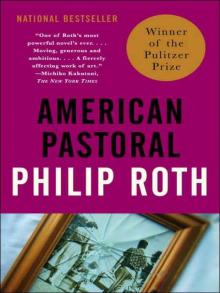 American Pastoral
American Pastoral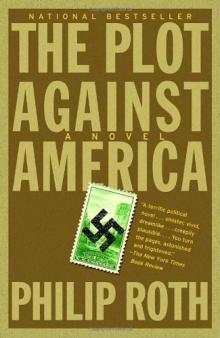 The plot against America
The plot against America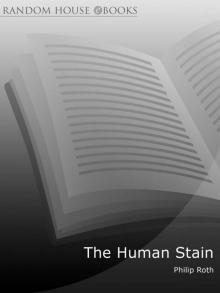 The Human Stain
The Human Stain Nemesis n-4
Nemesis n-4 Sabbath’s Theater
Sabbath’s Theater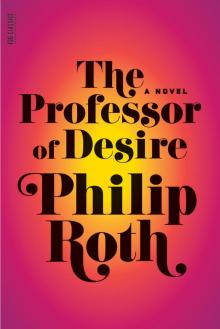 The Professor of Desire
The Professor of Desire Our Gang
Our Gang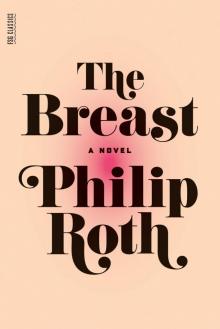 The Breast
The Breast Operation Shylock
Operation Shylock The Dying Animal
The Dying Animal Letting Go
Letting Go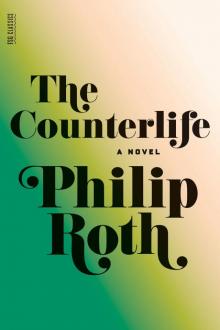 The Counterlife
The Counterlife Everyman
Everyman Nemesis
Nemesis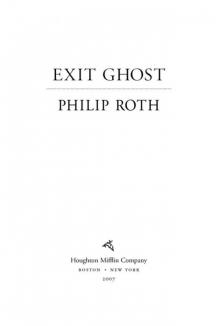 Exit Ghost
Exit Ghost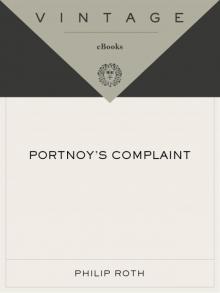 Portnoy's Complaint
Portnoy's Complaint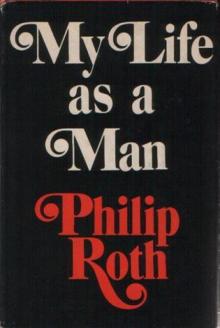 My Life as a Man
My Life as a Man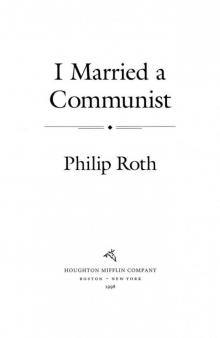 I Married a Communist
I Married a Communist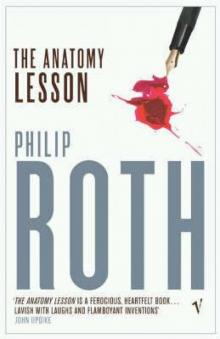 The Anatomy Lesson
The Anatomy Lesson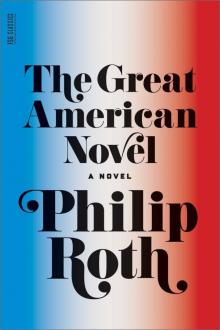 The Great American Novel
The Great American Novel Shop Talk
Shop Talk The Humbling
The Humbling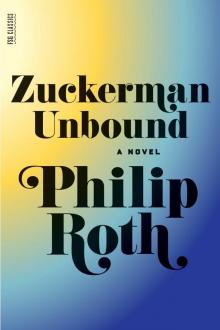 Zuckerman Unbound
Zuckerman Unbound When She Was Good
When She Was Good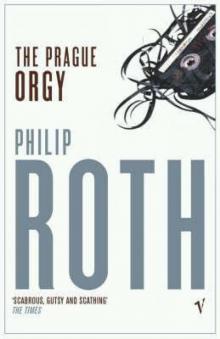 The Prague Orgy
The Prague Orgy American Pastoral (Nathan Zuckerman)
American Pastoral (Nathan Zuckerman) Goodbye, Columbus
Goodbye, Columbus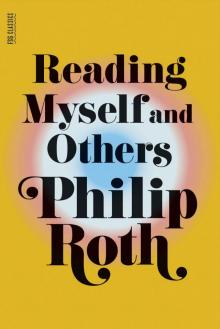 Reading Myself and Others
Reading Myself and Others